Please go to HERE for sign.
The signs are collected by 9 October 6pm(GMT +9, South Korea time), and will be published on the 10th.
Endorsement for the international statement
“NO ROK Navy 2018 International Fleet Review in Jeju Naval Base”

No War Base on the Island of Peace
Please go to HERE for sign.
The signs are collected by 9 October 6pm(GMT +9, South Korea time), and will be published on the 10th.
Endorsement for the international statement
“NO ROK Navy 2018 International Fleet Review in Jeju Naval Base”

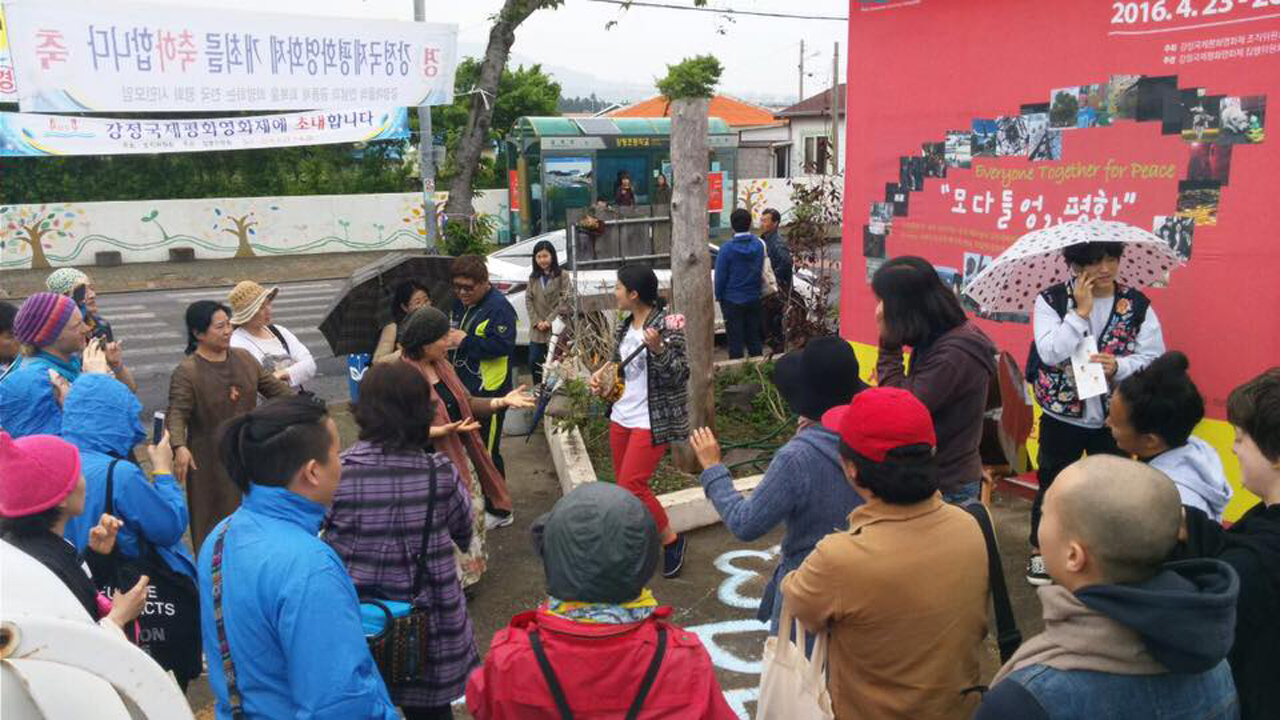
Go to the related sites: here, here and here
Closing Statement by the 1st IPFFIG
Everyone Together For Peace!
We are announcing the closing of the 1st International Peace Film Festival In Gangjeong. We believe that peace from a small village on Jeju Island will spread throughout the world. Even though we didn’t have enough time to prepare this event, Jeju islanders and peace-loving citizens from all over the country have voluntarily helped organizing this impressive and moving event. And thus, we are able to successfully close the peace film festival today.
We are planting trees of peace in a village where there is a massive naval base. It is everyone’s job to nurture and grow the trees so that it becomes a forest where many different lives can peacefully coexist. We hope that every participant of the film festival will become mountains, waters, forests and winds to blow away all barriers.
As the first international film festival on Jeju, and the first peace film festival in Korea, our beautiful arts event will never cease to look hard at the history of pain, and sympathize with the sufferings of our time. We hope we can contribute to transforming Jeju into the island of true peace and Korea into the center of world peace by speaking through our films, by communicating through culture and acting through arts. We will hold hands with the citizens of the world to cast away the cloud of conflict, violence and war.
Let us put down uncomfortable weapons, steaming resentment, boiling anger and far-fetched hatred. Let us sit together and indulge in the dark screen as the sparkling lights show up and shine, because the peace we are working to achieve is none less than passionate tears and bright smiles.
April 26, 2016
The 1st International Peace Film Festival In Gangjeong

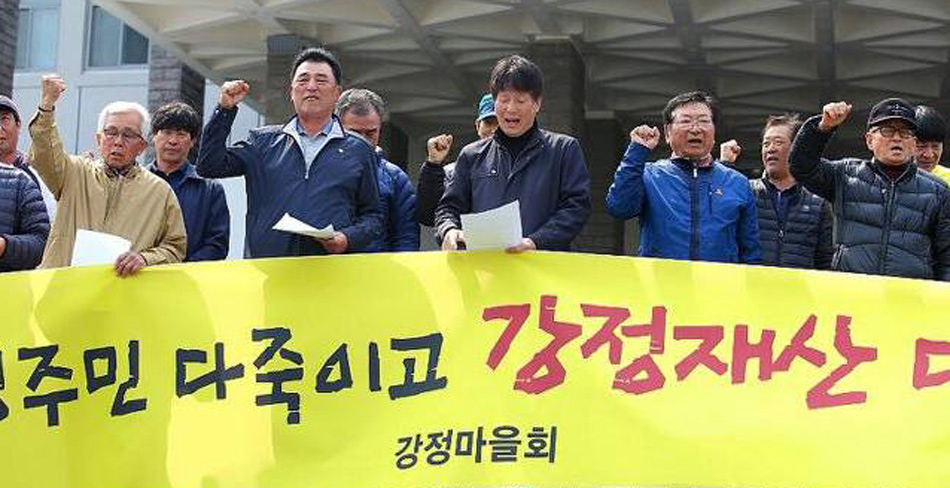
The Navy’s damage claim against Gangjeong residents is a declaration of war against its own citizens
By Lawyers for a Democratic Society (Minbyun)
The ROK Navy is claiming a sum of 3.4 billion won [approximately 3 million US dollars] in damages against 116 individuals including residents and clergy and 5 organizations. The Navy is demanding this money in compensation for the losses incurred by the construction company due to a 14-month delay in construction in the naval base due to residents, etc. obstructing the work. We (Minbyun) found that this case is an unjustified declaration of war against the people.
If the state suffered property loss, would it be fair to take individual citizens to trial to claim reparations? In pursuing its objective, the state has the power to seek criminal punishment and to take many steps including administrative measures, fines, penalties, non-compliance charges, etc. and the imposition of various administrative monetary sanctions. If such a state were to suffer financial losses due to a delay in construction and were to claim compensation from individual citizens, this could be used as a weapon to block all those who are critical of any state policy in the future. In this kind of situation, who would be able to oppose state policy?
When ominous heavy equipment destroys the foundation of life with no hesitation, citizens have no other power but to use their own bodies to stand in front of it. Before carrying out so-called ‘state policy’, the state should listen carefully to its citizens’ voices. When the reckless development of the state and large construction companies threaten the right of citizens to a peaceful existence, the right of citizens to oppose this must be guaranteed as their natural and constitutional right since sovereignty rests with the people. To condemn this action as illegal is to delegitimize the foundation of democracy.
The insistence that the construction delay was caused by residents is groundless. There are multiple complex reasons for the delay in the construction schedule.The principal reasons include disputes and controversy over the legality of the work, suspension orders issued over illegal construction work, losses and damage to structures caused by the natural environment, the strong wind and waves of Gangjeong’s coastline, Typhoon Bolaven, Typhoon Neoguri, etc. It is sophistry and exaggeration to claim that the residents blocking construction vehicles from entering and leaving the base for only a few minutes at a time caused the delay.
The responsibility lies solely with the state for threatening citizens’ right to a peaceful existence and causing their pain by enforcing this wrongful government policy. There is no one else as responsible for this as the government. The state rather than the residents bears the responsibility. Without mentioning a word about their own responsibility, it is the height of irresponsibility for the state to shift the blame for the delays in the construction onto individual citizens. The state that should be protecting the basic rights of its citizens is instead declaring war against them.
The Navy read and copied an enormous amount of criminal case records in the prosecution office in order to prepare this civil case. Individual criminal case files contain very important personal information so they only can be provided to a third party based on legal grounds. For example, in cases where the parties have applied for a trial or where the need to conduct an investigation is recognized, it is possible through a decision of the court. Even before the Navy can properly file a lawsuit on legal grounds, it must reveal whether it copied individual criminal case records.
Minbyun defines this claim for reimbursement not as one simple trial but as a provisional seizure used to strangle workers. Like this, it has a historical connection to the suppression of labor. It has a dishonest intention to extend dangerous statism to the judiciary. Minbyun will organize a legal team to fight for the 121 people and will make efforts and take measures to inform the public both domestically and internationally about the unconstitutionality and illegality of this case. The state should stop threatening citizens with this case. It should get out from behind this case and get down on its knees in front of its citizens and apologize for causing them pain.
March 30, 2016
Lawyers for a Democratic Society (Minbyun)
Han Taek-geun, Chairperson
Take Action: Please call the South Korean embassy or consulate nearest you and complain about this outrageous action to destroy Gangjeong village. Here is the link to find the ROK consulate nearest you in the US. Do it today!
…………………………
To see the original Korean commentary by MINBYUN, see here. The translation above was done in collaboration by the members of the Gangjeong Village International team and posted here under the permission of the MINBYUN.
The above is also re-blogged from here.
To see the article on villagers’ conference on March 30, see here
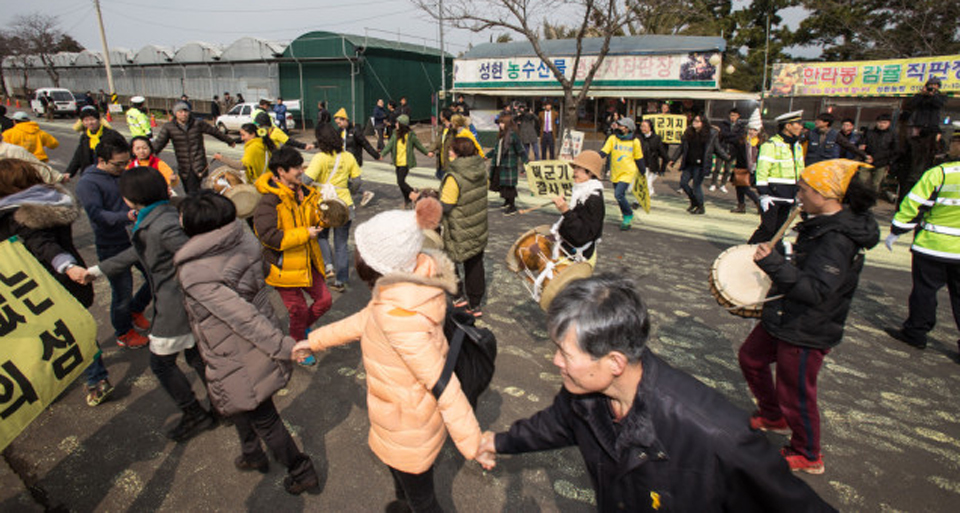
A full translation from people’s statement on Feb. 25, 2016, here
Our Position on the Jeju Navy Base Construction Completion Ceremony
4. Now by the power of Gangjeong villagers themselves, we would make Gangjeong village to be reborn as a ‘village of life and peace,’ not as a ‘military base icon.’ The declaration of this ‘village for life, peace, and culture’ was held before the navy ceremony on Feb. 26. It is the villagers’ noble step for true peace as well as the start of the restoration of the Gangjeong community. And all of us who pray for the peace of Gangjeong will strengthen our solidarity bear the blossoms of the flower of peace. In resistance we will remember and continue our actions and cries for peace in order to stop the Jeju naval base for even one minute, one second. The Jeju naval base was built with the backing of state violence. We will cover it over with the wave of peace.
Feb. 25, 2016
Gangjeong Village Association, Jeju Pan-Island Committee for Stopping the Military Base and for Realization of the Peace Island, and National Network of Korean Civil Society for Opposing the Naval Base in Jeju Island
See the below in a PDF file, here. ( forward by K. N./ Peace for the Sea in 2015)
Related posts are here and here
“PEACE FOR THE SEA IN 2015”
Statement by Participants of the International Peace Camp Held in Okinawa
We are an international group of activists working for peace at a critical moment in Northeast Asia. Earlier this fall, we gathered in solidarity from around the world for a five-day gathering called “Peace for the Sea.” As the second annual international peace camp of its kind, its goal was to promote inter-island solidarity among our communities in Jeju Island of South Korea; the islands of Taiwan; and Okinawa and other Ryukyu Islands, including Miyakojima, Ishigaki, Yonaguni and Amami-Oshima.
Ichariba chōde (行逢りば兄弟) is an Okinawan proverb that carries a special resonance for our group, meaning “Once we meet, we become brothers and sisters.” We already share a kinship of historical memory as survivors, witnesses, descendants, and advocates. Indeed, the Ryukyu Islands, the islands of Taiwan, and Jeju Island all bear legacies of suffering, given our parallel experiences of Japanese colonial occupation and postwar authoritarian rule in the shadow of the Cold War under US hegemony. Furthermore, the security of Taiwan has long been used as an excuse for the stationing of troops in Korea and Japan.
As we mark 70 years since the end of World War II in the Asia-Pacific, we are still struggling against the unresolved contradictions of both that conflict and the Cold War, while also contending with the emerging reconfiguration of bipolar rivalries into a New Cold War. Truly, it is more pressing and necessary than ever to strengthen our solidarity as a transnational community of peace. In the spirit of Ichariba chōde, we have sought to strengthen our solidarity as a sisterhood and brotherhood of peace.
The Urgent Necessity of “Peace for the Sea”’
Following our first “Peace for the Sea” program in Jeju last year, we could not have anticipated the urgency of being in Okinawa this autumn. On the day that we arrived for our Peace Camp in late September, the railroaded passage of war bills by the Japanese Parliament marked a grave turning point, forsaking the country’s longstanding pacifism, despite massive protests throughout Japan. Shortly thereafter Okinawa’s Governor Onaga Takeshi spoke in front of the United Nations Human Rights Council in Geneva. He said, “The building of the new base in Henoko is a violation of the right to self-determination of the Okinawan people.” During that same period in Korea, an Aegis destroyer entered the Gangjeong Sea for the first time to conduct a test-mooring in the harbor of the naval base that is nearing completion, foreshadowing the end of Jeju’s identity as an Island of Peace.
As we know by now, these alarming developments are all related to the “Asia pivot,” which the Obama Administration first announced five years ago. This term commonly refers to the policy of redirecting US foreign policy and military strategy away from the Middle East and toward countries in Asia and the Pacific Rim, in response to the rise of China. But what it really means is the escalating confrontation of two hegemons, the US and China, competing for control over the last resources on earth. Truly, 2015 is a year that has seen a breakneck expansion of the region’s militarization on a scale that is unprecedented.
We fully understand that this shift will not bring about greater human security but will instead yield the conditions for a far greater risk of war and tremendous environmental destruction. We further recognize that these changes have been fueled by the global weapons industry, which reaps enormous profits from increased military tension and conflict, while ordinary people and the wider ecosystem suffer the inevitable consequences. Amid such developments in the globalization of the weapons industry, Taiwan is also implicated as a consumer through its obligation to purchase millions of dollars in US arms through the secondary market, as stipulated by Taiwan’s treaty of mutual cooperation with the US (i.e. the Taiwan Relationship Act).
A Resilient Community Affirming All Living Creatures
Many of us have come to Okinawa for the first time, and our hosts taught us the Okinawan saying, “Nuchi du takara” (ヌチドゥタカラ – 命ど宝), meaning “Life is a treasure,” or “Nothing is more precious than life.” What at first sounds like a simple life-affirming phrase is in fact shadowed by the harrowing experience of mass death during the Battle of Okinawa. In this way, “Nuchi du takara” is also a message of profound resilience: Bearing the memory of devastating tragedy and hardship, the response of Okinawan people has been to embrace life unequivocally.
So we, too, are today facing mortal threats to the collective peace in our region, and similarly our response must be to affirm the coexistence of all living creatures and to build a strong transnational community of friendship and solidarity. We are all part of nature and have the responsibility to protect the water, land, and air upon which we depend to survive.
We condemn the degradation of the natural environment and the structural violence committed against island residents and other marginalized peoples, whose interests have too often been sacrificed for the sake of exclusive and destructive forms of nationalism, or global capitalism in the guise of nationalism.
Our Shared Conviction for Peace
We stand together to oppose the dangerous militarization of this region and the destruction of our peaceful communities and our vital ecologies:
■ We demand a stop to military exercises, which are escalating regional tensions, wasting precious resources, and leading to the mass beaching of sea mammals.
■ We demand a stop to dredging to make new artificial islands, a process that destroys marine ecologies.
■ We demand a stop to the naval base construction at Gangjeong.
■ We demand a stop to the helipad construction at Takae.
■ We demand a stop to the radar base construction at Yonaguni.
■ We demand a stop to the plans for base construction at Ishigaki, Miyakojima, and Amami-Oshima.
■ We demand a stop to the plans for base construction at Henoko.
We invite more people – both in East Asia and throughout the world – to join us in taking the initiative to promote peace. Toward this vision, we will continue to work closely together, and we look forward to the third international peace camp next year in Taiwan.
We cannot leave this work to political leaders and governments, which largely answer to corporate interests and the military-industrial complex. We challenge the prevailing assumptions behind the current configuration of geopolitics that takes for granted the precedence of nation-states, military interests, and capitalist accumulation.
We will instead create another kind of geography. Through our peace camp and similar projects, we are already creating alternative political communities based on a sustainable economy, the ethics of coexistence, and our shared responsibility to preserve peace.
What a wonderful news! The International Peace Bureau(IPB) decided to have Gangjeong, Jeju, and Lampedusa, Italy, as the co-recipients of the precious Sean MacBride award for 2015. On Aug. 25, 1 page official letter was sent to the village, along with other two related documents as the below. Please look at those for further details. It is truly the honor of the village to receive this award and to stand firm with the people in the world on the path for peace, justice, and democracy.
2. IPB documents on the two Island communities: Lampedusa and Gangjeong, Jeju
3. Peace Paths: Annual IPB Conference program_On the 70th anniversary of the entry into force of the United Nations Charter
“Urgent call for people to go to Gangjeong this weekend as villagers brace themselves for yet another unleashing of brutal state violence. Gangjeong villagers are on tender hooks as they await the administrative execution of a demolition order by the ROK Ministry of National Defence (Saturday Jan 31) against a protest site set up to resist the building of military accommodation in the village center right next to a primary school. The navy are not content with taking over the coastline and destroy marine life with the building of the naval base they now want to irreversibly transform the village into an ugly military camp town. The administrative executive order will apparently be enforced by a bunch of hired thugs and military police from the mainland-apparently numbering up to 900 invaders in total who could descend on the village to stage a brutal show of state violence against defenseless villagers/activists. Please spare a thought for the villagers and activists who continue to resist state violence as they struggle to retain the identity of this once pristine village now blighted forever by an ugly naval base. We stand together and resist together-please help them stop the takeover of their village and the militarization of the island of Jeju!” (By Fr. Pat. )
Below is the words that Mayor Cho sent to the villagers in the afternoon of Jan. 30.
It will be very a long, cold and dark night tonight. However, people are gathering together here. Please be with us in your thoughts and prayers.
The navy has not gained the consent of Gangjeong villagers yet, refused the negotiation by the Jeju Governer and even failed to get support from Seogwipo City.
Yet, It is informed that the navy will enforce the administrative execution order to remove the sit-in tent in front of construction site of military family housing at 7 am tomorrow morning. Those guys, who don’t feel ashamed and are very rude, are going to storm into the village.
Villagers! We should not let them occupy our village. The navy are mobilizing police to close the roads into the protest site from very early morning.
Please come out and join to stay with us at the sit-in tent from tonight!
Or please come gather at the sit-in tent around 5 am tomorrow morning.
We should pass down Gangjeong Village to our descendants without feeling shameful. When we gather our hearts as one heart and flow like a river, then we can keep our village. We are proud residents of Gangjeong.
Forever the best of best Gangjeong!
Gangjeong Village Mayor, Cho Kyungcheol
(By Jungjoo)
(All the image source by a peace activist, here)
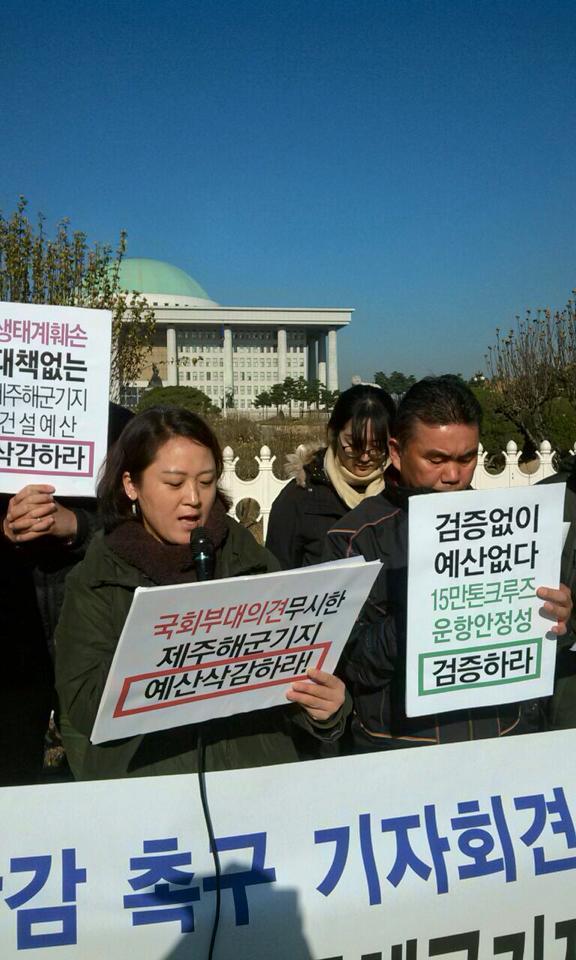
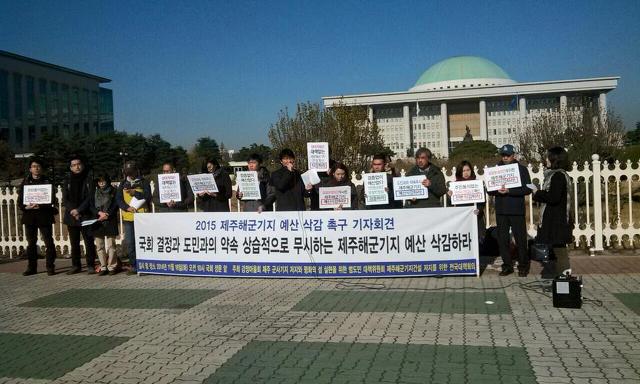
On Nov. 18, the Gangjeong village association, Jeju Pan-Island Committee for the Stop of Military Base and for the Realization of Peace Island, and National Network of Korean Civil Society for Opposing to the Naval Base in Jeju Island officially demanded the National Assembly to cut the 2015 Jeju naval base budget of 298 billion won (about $290 million USD) filed by the Government. In their opinion statement, the groups claimed that the Government has habitually ignored National Assembly decisions and promises with the Island people (See the below sources)
The seven reasons to the cut the 2015 Jeju naval base budget
(* Only big titles were translated here. Each details are currently available only in Korean in the below sources)
_Violation of the 2014 budget collateral conditions given by the National Assembly
_Need to reexamine the safety matter of 150,000 ton cruise navigation
_Military housing building project that amplifies conflicts
_Harbor construction without the measures on environment contamination
_Stagnation on the executive results and annual transfer possibility
_Invalid Jeju naval base project
_Continued human rights infringement and government negligence on conflicts
Proposals by the Gangjeong village association and civic society
There should be an inquiry on the responsibility of the Ministry and navy’s habitual violation of National Assembly collateral conditions.
There should be the prompt stop of military housing building that amplifies conflicts. There should be the whole cut of 9,819,000,000 KRW (about $ 9 million USD) construction budget; of 347,000,000 KRW (about $300,000 USD) supervision cost; and of 36,442,000,000 KRW (about 30 million USD) purchase cost for military apartment.
In relation to entry & exit of the military-related vehicles, the construction budget for 19.5 billion KRW (about $ 18 million USD) for the entry road of which its building has not been agreed with villagers should be frozen until measures for noise and environment matters are prepared for.
Also there should be the cut of harbor & bay facility construction cost of 96.4 billion won (about $ 90 million USD); of land facility construction cost of 112 billion KRW (about $110 million USD); of harbor & bay supervision cost of 2.3 billion won (about $2 million USD); and land supervision cost of 2.3 billion won(about $2 million USD), with an inquiry on the responsibility of the supervising committee’s poor management, as well as a demand that the execution of construction budget should not be done unless there is preparation for the measures on the protection of ecology system and soft corals.
In the project promotion budget, there should be the whole cut of about 11 million KRW (about $10,000 USD) for the events such as local residents-invitation events, visitor-welcome events, conflict-management activities. And in the indirect cost, there should be the cut of about 36.5 million KRW (about $ 30,000 USD) for the public relation material production (booklets, leaflets & other materials) and newspaper advertisement. Those budgets bring concern that they could stir up conflicts as the navy makes unilateral public relation, justifying the Jeju naval base project.
The problem of location selection was proved again. Following the destruction of seven caissons – huge concrete structures for the breakwater installed on the maritime of the Jeju naval base construction site- by the typhoon Bolaven in 2012, three caissons were also pushed or slanted down by the typhoon Neoguri ( with the maximum wind speed 19.5 m/s ) in 2014. Fundamental examination on the matter is necessary.
To resolve the conflict on the Jeju civilian-military complex port, the should-be–clearly-examined in the truth investigation raised by the current Won Hee-Ryong Island government (See the Oct. newsletter, Page 1) are the propriety matter of the village general meeting (* which was manipulated by the navy) at the time of the invitation of the Jeju naval base project; validity matter of environment impact assessment; propriety matter of annulment of absolute preservation area not to mention validity matter of location selection; layout errors in relation to the safety matter of 150,000 ton cruise navigation; and suspicion on the data manipulation raised in the process of simulation and the substance of external pressure. To resolve those matters, the Government and National Assembly should be responsible to act.
Before more construction progress, there should be through verification on the reason of the postponement of layout change on the west side jetty and safety matter of 150,000 ton cruise navigation. Also there should be a prompt environment and legal examination whether the planned sea route (changed) can properly work as the Jeju naval base sea route.
Further, there should be total reexamination on the location and military validity as there is a big concern that the Jeju naval base is fundamentally to be used as an outpost for the ROK-US-Japan trilateral military missile defense and naval cooperation targeting China and is to aggregate nuclear arms cost and military confrontation in the Northeast Asia.
Source:
People’s Solidarity for Particpatory Democracy
Solidarity for Peace And Reunification of Korea
Love you, Gureombi (Gangjeong village website)
January 26, 2014
Your Holiness Pope Francis,
The people of Gangjeong Village on Jeju Island, South Korea await your announced visit in August with great anticipation for they have been peacefully, and non-violently protesting the construction of a large naval base to accommodate the U.S. pivot to Asia.
For seven years, these farmers and fishermen, and their peace activist supporters from around the world, have been protesting seven days a week, 365 days a year. The Bishop of Jeju, Peter Kang, has supported the protest with his frequent presence, and by allowing his priests and nuns to participate.
Your Jesuit brothers in South Korea have been at the forefront of this struggle. Several have been arrested, fined, and imprisoned. During my stay there in September of 2012, I got to know them well, and I was pleased to see the Catholic Church and the Jesuit Fathers leading the struggle for peace and justice. And, busloads of Catholic nuns from all over South Korea regularly go to Gangjeong to protest and stand in solidarity with the villagers.
Daily mass is celebrated in front of the main gate to the base. Never before have I witnessed the sense of community shared by people of all faiths and backgrounds.
The struggle in Gangjeong Village is important for the Peace Movement around the world because everything is in focus there. These people are farmers and fishermen who will lose their livelihoods and their 500 year old village. They a protesting against the military and imperial expansion of the United States; they are protesting the occupation of their country by tens of thousands of American troops; they are protesting against the violation of human rights; and they are protesting against the desecration of a pristine ecosystem, home to several UNESCO world heritage sites.
Furthermore, in 2005, Jeju was declared “The Island of World Peace” because of the horrible massacres, at the hands of the U.S. Army in 1948, where as many as 60,000 men, women and children were murdered in a scorched earth campaign to wipe out opposition to the American occupation and the separation of the country at the 38th parallel. What followed during the Korean conflict was the carpet bombing and napalming of North Korea until there were no more targets left. It was the first time that the world would see the unrestrained violence inflicted upon indigenous people fighting for freedom, self-determination, and their basic human rights.
I went to Jeju in September of 2012 to make a documentary film. I thought it would be a short story about the anti-base protest, but what I learned there inspired me to make the enclosed feature-length film, The Ghosts of Jeju, which just recently was named an official selection of the Chicago Peace on Earth Film Festival in March of this year.
The documentary has now been seen in more than a dozen countries, including Russia. It is being translated, by volunteers, into Korean, Russian, French, Japanese, and German because people who have seen it believe this story must be told.
The people of Jeju have asked me to send you a copy of the film in preparation for your visit to South Korea in hopes that you will visit Gangjeong Village to stand in solidarity with them. This film reveals the untold and hidden history of American involvement in Korea from the end of World War II to the present day. Most people in America and around the world, and most Korean people are not aware of this history, nor are they aware of the plans of the U.S. to raise tensions in Asia and to dominate by overwhelming military might.
Your Holiness, the entire world is looking to you as the most influential voice for the poor and for peace and justice around the world. A visit to Gangjeong will give hope to people everywhere who are opposing war, militarism, and the abuse of human rights.
Respectfully and with profound hope and respect for your papacy,
Regis Tremblay
Pax Tibi Productions
209 River Rd.
Woolwich, Maine 04579
USA